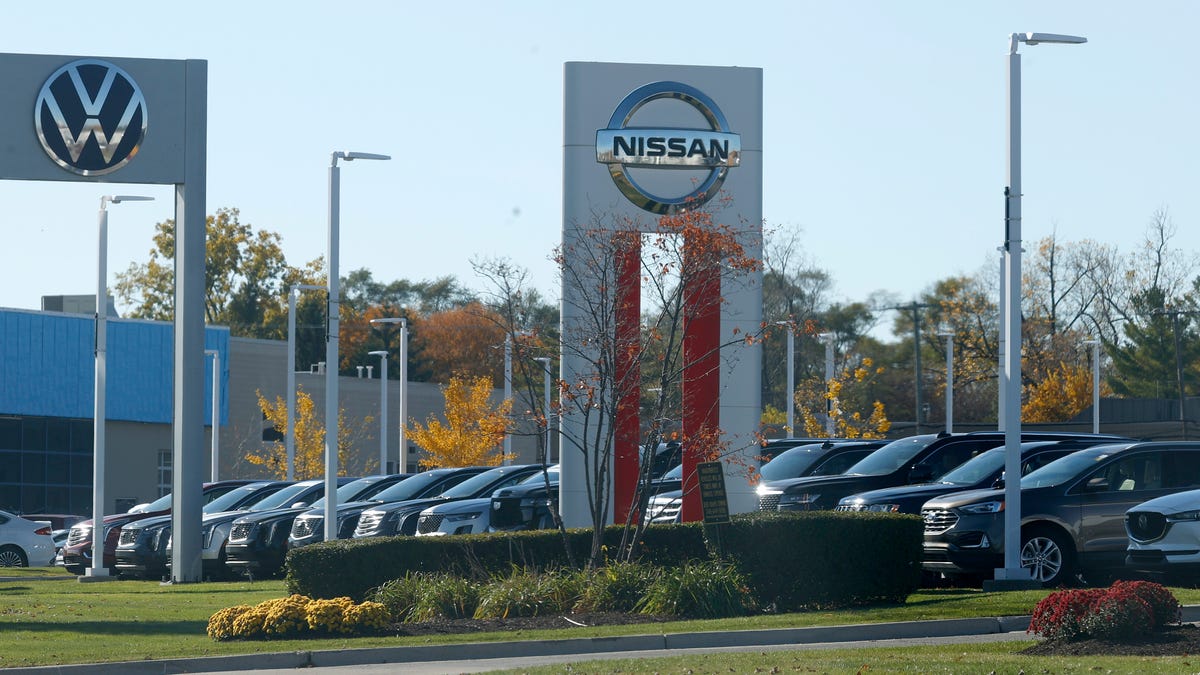Should you buy a car before auto tariffs go into effect?
President Donald Trump has announced a 25% tariff on imported cars and key auto parts. Here’s what it means for consumers and automakers.
- Italian automaker Ferrari has said it will increase prices on some of imports by 10%.
- Wedbush Securities now estimates automakers will have to increase new car prices by $5,000 to $15,000.
A Wall Street firm is increasing its estimate on how much carmakers will likely have to raise the prices of new vehicles to offset the 25% tariff President Donald Trump implements on any vehicles or auto parts imported into the United States.
The increased estimate comes on the heels of news that uber-luxury sports car manufacturer Ferrari appears to be the first automaker to say it will be raising its prices by a maximum of 10% on all models imported to the United States after April 2, according to Reuters. Ferrari manufactures all its cars at its Maranello facility, in northern Italy.
But it’s not just the imported super luxury carmakers that will be forced to boost prices, experts said.
“Over the last week we have spoken to many in the auto industry from around the US, Europe, and Asia and the conclusion is this tariff announcement (in its current form) would send the auto industry into upside down mode and raise the average price of cars between $5,000 on the low end and $10,000 to $15,000 on the high end,” wrote Dan Ives, managing director at Wedbush Securities, in a research note Monday.
Previously, Wedbush had topped its estimate at $10,000.
A US car is a ‘fictional tale’
The Ferrari announcement, in response to the new tariffs, indicated to Ives that, “Every automaker in the world will have to raise prices in some form selling into the US and the supply chain logistics of this tariff announcement heard around the world is hard to even put our arms around at this moment.”
Trump has said he favors the tariffs because they will drive U.S. manufacturing, bring in hundreds of billions of dollars in tax revenue and create jobs. Trump told NBC News in an interview Saturday he “couldn’t care less” if automakers raised prices due to new tariffs.
“I hope they raise their prices, because if they do, people are gonna buy American-made cars,” Trump said in the interview.
NBC said after the interview, a presidential aide told the network Trump was referring specifically to foreign car prices.
The problem is there are no completely American-made cars. Even those automakers that assemble cars in the United States have about 40% to 50% of their parts that come from abroad, Ives said.
“A US car with all US parts made in the US is a fictional tale not even possible today,” Ives wrote. “In our view it would take three years to move 10% of the auto supply chain to the U.S. and cost hundreds of billions with much complexity and disruption.”
An ‘untenable head-scratching number’
Ford Motor Co. has the largest manufacturing footprint in the United States, importing just 21% of the vehicles it sells here. Yet, CEO Jim Farley told the Ford workforce late last week that regardless of that fact, Ford is not “immune to the impact of tariffs, which could be meaningful.”
Farley said Ford was studying the potential impact tariffs could have on the Dearborn-based automaker’s operations and he anticipates the fallout from tariffs are, “likely to be significant across our industry.”
General Motors imports about 46% of the vehicles it sells in the U.S., according to research firm GlobalData. In a message it posted last week on GM’s internal website, which was obtained by the Detroit Free Press, the company wrote: “We are now identifying potential impacts by supplier, vehicle program, plant, and other factors, and working through what we need to do and when. We are in a strong position to navigate this dynamic situation and will continue to deliver for our customers, employees, and communities. Each of us can contribute by staying focused and delivering on plans for this year, maintaining a disciplined approach and managing discretionary costs.”
Ives said even Tesla will not emerge a winner in the new tariff initiative. According to the 2024 Made In America Auto Index from American University, the Tesla Model 3 Performance has the most domestic content of any car sold here with 87.5% of its parts dometically sourced.
“Even Tesla still is clearly hit from these tariffs and will be forced to raise prices,” Ives said, emphasizing the 25% tariff is almost “an untenable head-scratching number for the US consumer.”
Need more detail from the White House
Ives previously told the Free Press that his team estimated the tariff could cost the broad auto industry, including suppliers, $100 billion to $125 billion in additional costs. He stood by that in Monday’s research note, adding that those costs will “essentially get passed directly onto the consumer and clearly erode demand on Day 1 of tariffs.”
Ives said Wall Street is waiting to learn more around the details and implementation of this policy from the White House, but, for now, investors “continue to be bewildered by this announcement … as this 25% auto tariff number is hard to digest and will continue to put major pressure on GM and other auto makers/suppliers globally (including Tesla) until more clarity happens.”
Trump has dubbed this Wednesday as “liberation day.” That is when he will reveal his long-promised set of global tariffs, which he said will free the United States from a dependence on foreign goods and spark the rebirth of the nation being a manufacturing superpower.
Jamie L. LaReau is the senior autos writer who covers Ford Motor Co. for the Detroit Free Press. Contact Jamie at jlareau@freepress.com. Follow her on Twitter @jlareauan. To sign up for our autos newsletter. Become a subscriber.


